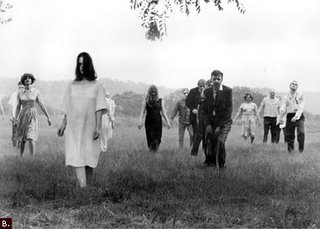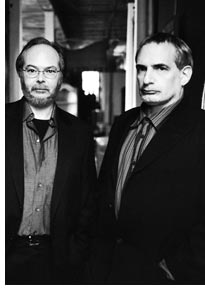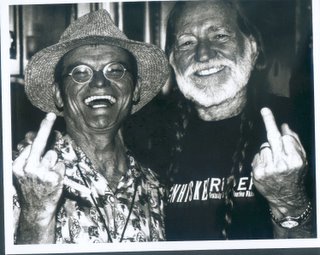
 K-punk, alive, went and drew zombies to the window,
K-punk, alive, went and drew zombies to the window, which is fine, but me - zombie me of this spot’s banner - wasn't to sit still long.
Simon brought a rifle from the basement, but I wouldn't mind letting our blank friends in for a sit, to, you know, pick their brains. See, K-punk’s suggestion – “What Pop lacks now is the capacity for nihilation, for producing new potentials through the negation of what already exists” – rang a big bell in my Warhol house; go ahead and look at Elvis up there, repeated and decentralized, each one an imitation of the other with no original in sight. Warhol broke Elvis’ uniqueness by serializing his being – no essence there. Zombies, too, are mimetic: the infected feasts on the flesh of something living in order to, a la their conceptual cousin the vampire, turn the other being not into itself, but something *like* itself that functions in the same way.
What's interesting isn’t the mere metatphor of the zombie, but rather who gets to lay claim to coveted undead status. Fuck Bret Michaels, who might be animatronic or built ground-up from plasticine, it’s
consumers that strike me more as zombie-types these days. Simon talks about download fever and overconsumption; in 1982, I slid out and have been an omnivore ever since. At first, downloading was a way for me to delve into marginalia of favorite bands; over time, it became a street for me to stalk, gnawing at everything that twitched in the corner of my eye.
Part of the issue is perhaps a misguided obedience to the idea of eclecticism. For whatever we say about “rockism” or whatever, I think most people still tend to associate the idea – which is supposed to be about the discourse around music rather than the music itself, I guess – with “rock.” The word, fer chrissakes; get a new one or something. Point being, Simon’s gone into “you can still talk about hip-hop like a rockist” rhetoric, which, while not exactly shocking, does remind us that
eclecticism is not the opposite of K-punk’s
nihilation scheme, per se. If anything, one goes to blow a smoke veil in front of the other – having more kinds of music suggests to us that there is healthy competition, when really, music just seems more delicately and thoroughly segregated.
(The impression of some difference – the imperfections of Warhol’s silkscreen technique, the subtle variations of color, the suggestion of a zombie’s individuality from the physical resemblance to their pre-undead source material – could remind me of pop’s slim pickins and the confusion between superficial diversity and true negation.)
The thing about Warhol was that he meant well. You know the whole possession trope – “Oh shit, that’s
my song” – well, Warhol wanted that too, talking in
The Philosophy about playing a record enough to literally empty it of meaning and become a repository for one’s individuality, memories, etc. Warhol wanted this stuff to just get more similar, to get played not into death but into
undeath where they could live again as a-conscious placeholders. I’m not advocating that method of consumerism per se, but it does seem to repeat the zombie propagation plan – take something and empty it of itself; make it
you.
I’m not sure exactly what kind of hope to have in this other than to cast it in a weird quasi-historical capitulation: the most ironic, inverted aspect of Warhol’s zombie pop vision was that he made his crusade for mimesis/viral repetition/homogeneity into his signature trope, which was brilliant and marginally evil – part of what makes him such an interesting character, really. Still, that ideal’s gone dead; we’re post-possible in making zombies inspiring figures, really.
--
To get out of the space of the theoretical for a few wooden words:
Who the fuck listens to “pop” anymore besides wanks like me/you that are self-conscious enough to use the word? Ask my 13-year-old sister if she listens to pop. Duh, she listens to rock (Greenday) or hip-hop (Black-Eyed Peas); she listens to country (Willie Nelson), but I doubt she’d say “I listen to pop music.” Of course, we’ve got the Pop and the pop(ular) divide to deal with here, one that seems to only have increased as genres spawn indefinitely and we’re all told to respect everything – totally “separate but equal” in some sense. If ABC still exists, it’s through the hyper-critical/self-consciousness of – gasp – Art Brut or through the “enlightened” production fetishists that enshrine Richard X or – ha-ha-ha, Jazze Pha.
I realize this goes in a different direction than the “retro” aspect of what Mark & Simon were talking about, but I think it’s important to lay some sort of responsibility somewhere other than the bands themselves – the Arctic Monkeys don’t have hundreds of thousands of co-workers/proud aunts/girlfriends, they have
fans, and they’re hungry for something, anything.








